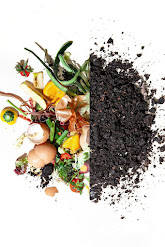We find it difficult to preserve cooked food as it gets spoiled next day due to different weather conditions. It is mostly found that a small quantity of food(like a bowl of rice,2-3 spoons of pulses etc.) is left uneaten. Decomposition of this leftover is a challenge in itself as we shouldn’t throw it in dustbin or in vain as it is called as disrespect of food in our Indian culture.
So here is the solution to the
problem. We can dig a small pit in our garden or a common pit in our locality
to decompose this biodegradable leftover. We can also ask our municipality to
take initiative to collect these leftover’s on regular basis and decompose into
a large pit and convert it into manure. This manure can be supplied to farmers
and can be a way of income generation to government.
Now I want to ask you to come
forward and take initiative to create awareness in your community and ask
government or NGO’S to look into the matter.
NOTE-
Having a way decomposition does
not mean that we cook food more than we need and then decompose large quantity
of food. I want you to take all the measures of reducing food waste conveyed in
previous blogs. Decomposition of leftover if only asked for small quantity of
food as mentioned above.
Regards-
Aamena

Comments
Post a Comment